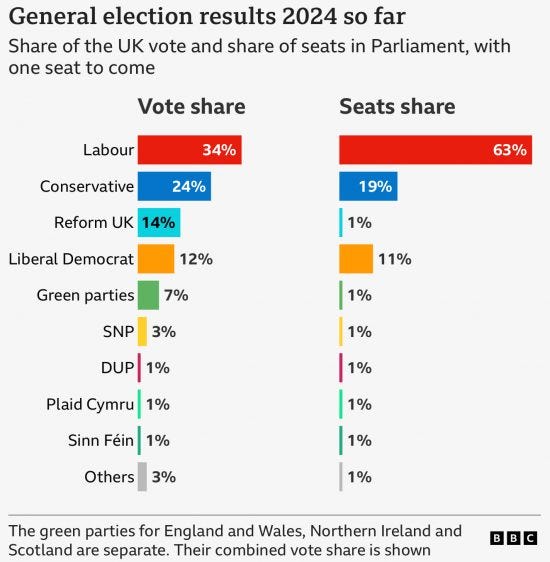Four years ago Sir Keir Starmer asked Gordon Brown to plan
“the biggest ever transfer of political power out of Westminster and into the towns, cities, and nations of the UK.”This may sound good but it isn’t. Far from ushering in a golden era of democracy it attacks what may be our country’s most precious possession, the ability to hold power to account.
For ironically, people are less interested in local politics than national affairs.
The turnout in the 2019 UK General Election was 67.3% but in 2021 that for English local elections was only 35.9%. Partly this may reflect our sense that many key decisions are taken in Westminster; also, the news media tell us more - or opine more - about MPs than about our local representatives.
Yet Starmer’s planned devolution rollout may, perhaps unintentionally, offer the prospect of a proliferation of petty tyrannies inadequately validated by the will of the people.
Take the Mayor of London for example. Sadiq Khan has just begun his third term, on the basis of a
40% turnout and 43.8% of ballots in his favour. His power is founded on just over one in six of registered voters yet he feels entitled to
restrict or tax civilian movement in the name of climate change and even tell Londoners
how they may speak to their ‘maaates.’ He is in many respects king of 600 square miles of territory and nine million subjects.
And unlike other mayors he cannot easily be deposed, not even by a referendum following petition. His position is rather more secure than that of the Prime Minister.
Speaking of tenure, let us turn to the Welsh Assembly. On 5 June the Senedd leader Vaughan Gething, a ‘
close ally of Sir Keir’, lost a vote of no confidence but instead of resigning burst into tears and refused to step down. If James Callaghan had taken the same approach
in 1979 this would be a very different world indeed.
For more extreme despotism look at Scotland. The Hate Crime and Public Order (Scotland) Bill introduced in 2020 by the then Justice Minister Humza Yousaf and now in force applies not just to banners and vocal utterances in public but to private conversations in the home and
‘websites, email, blogs, podcasts etc.’ The police can use a warrant to burst into your house; if convicted you may be
imprisoned for up to seven years, depending on the category of offence.
Yousaf’s
speech introducing this Bill is infamous for his racialist tone. Scotland had
nine ancient tribes and there are still
some 140 clans, maybe far more; yet all he could see in this diversity was white skin. The fact that
95.4% of Scots identify as white did not lessen his insinuation of being unfairly held down by prejudice. North of the border, let no-one dare suggest otherwise, in any form. Where is
Mel Gibson bawling ‘freedom!’ to his fellow Scots when they need him?
Alba gu bra!
This is what we face: the spread of high-handed pseudo-democracy like an epidemic of measles.
But Starmer faces a difficulty in pursuing this project, if he insists on so doing. We may hold that an electoral victory for Labour, whatever the margin, is insufficient to authorise such a major constitutional change. This dead rat is not made palatable by throwing it into the manifesto stew, not that any government considers itself irrevocably committed to the whole cauldron of promises it makes in such documents.
The EU issue shows us the way. In the last General Election before accession to the ‘single market’ the
1970 Labour Government’s manifesto said ‘We have applied for membership of the European Economic Community and negotiations are due to start in a few weeks' time’ and the
Conservatives’ said ‘We believe that it would be in the long-term interest of the British people for Britain to join the European Economic Community.’ Some choice!
So in we went, under Heath; and when Wilson returned to power in 1974 he felt the need to reconfirm the decision by means of a referendum, held in 1975. The
Labour brochure howled that it was all about ‘FOOD and MONEY and JOBS’
(capitalisation sic) and reassured us (‘Fact No. 3’) that ‘The British Parliament in Westminster retains the final right to repeal the Act which took us into the Market on January 1, 1973. Thus our continued membership will depend on the continuing assent of Parliament.’ How could we lose? The Conservative brochure
‘Yes To Europe’ similarly painted the positives for remaining and the fearsome unknowns of leaving.
Yet leave we did at long last, much to everyone’s surprise - that is, everyone who was anyone. It turned out that the lifeboat on the Euranic was more than a courtesy detail.
So, two referenda on an issue where we had the freedom to exercise our choice. Unfortunately Parliament and Whitehall have since acted like a barrister who having received the client’s express instruction has instead colluded with the prosecution against his interests. Can it come as another surprise to find that the people have chosen to dispense with their attorney?
Yet if there is to be a Conservative Party for the future, it is needed now more than ever, when constitutional changes are in prospect that seem intended to be irrevocable. The Starmer/Brown proposals are not about taking power away from Westminster, but from the people. Without our specific approval through a referendum they cannot proceed under any pretence of a mandate.
